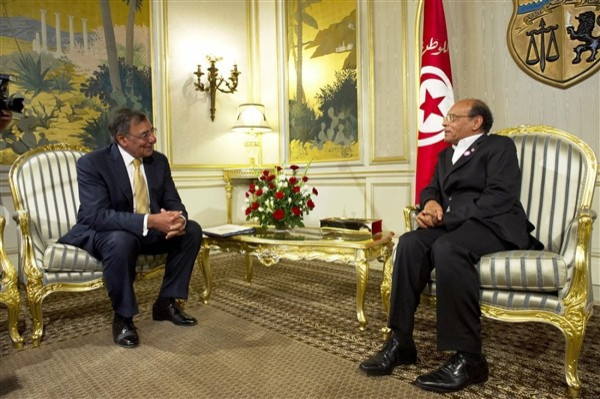US Pledges Support For Tunisia Amid Rising Extremism

Defense Secretary Leon Panetta praised Tunisia's transition to democracy Monday and said the U.S. is prepared to provide the North African country with economic and military support.
"This is the birthplace of the Arab Spring, when the Tunisian people rose up in peaceful protest to demand democratic change," Panetta said, referring to the December 2010 popular uprising that overthrew the autocratic regime of President Zine El Abidine Ben Ali.
"It not only inspired the region; it inspired the world."
Panetta met with Tunisian President Moncef Marzouk and Prime Minister Hamadi Jebali in the capital, Tunis, as part of a five-day trip through North Africa and the Middle East, including Egypt and Israel.
"In my discussions today, I was pleased to begin a dialogue on how we can deepen that cooperation in a range of common concerns: countering violent extremism and terrorism to ensure regional stability," Panetta said.
"I also conveyed that the Department of Defense stands ready to help Tunisia strengthen the capacity of its defense institutions as part of the broader effort to support Tunisia's democratic transition."
In what capacity and to what degree the U.S. intends to support Tunisia has yet to be determined, but it is clear that Islamic extremism and terrorism are major concerns for the Pentagon.
Indeed, since Ben Ali's ouster, members of the radical Muslim movement known as the Salafists have gained wider influence in promoting their agenda of remaking Tunisia into an ultraconservative Islamic state.
Under the secular, repressive rule of Ben Ali, Salafism gained an underground following. With a moderate Islamic administration currently in power, the Salafists have more freedom to spread their ideology.
This has manifested itself in protests against "blasphemous" art, anti-Semitic fervor and vehement denunciations of secular leadership.
There is concern that Tunisia's weakened economy, which shrunk 2 percent in 2011 with current unemployment hovering at 18 percent, could lead to further radicalization of young Tunisians.
"There's no question that unemployment aggravates the situation," said William Lawrence, the North Africa representative for the International Crisis Group think tank, in an interview with the Associated Press.
"They go to Salafism because they have nowhere better to go socially, politically and spiritually."
Panetta's pledge of economic and military support is no doubt inspired by this reality.
"While there is uncertainty in the region deriving from the Arab Spring, there is also opportunity," Panetta said, according to a Defense Department press release paraphrasing its chief.
© Copyright IBTimes 2024. All rights reserved.



















